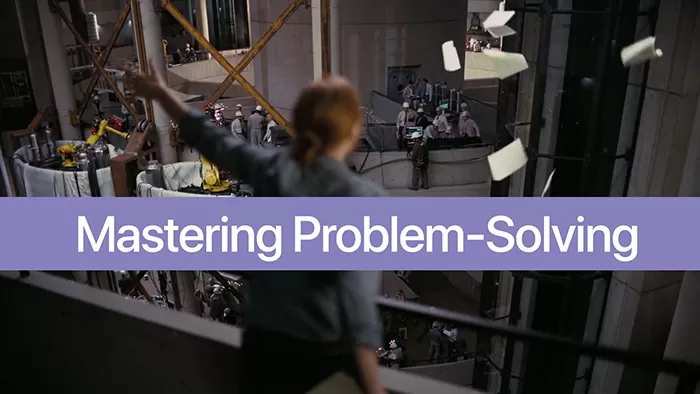Introduction
In our journey through life, we encounter a myriad of challenges, both big and small. The ability to tackle these challenges effectively is what sets individuals apart.
Problem-solving, a fundamental skill, plays a crucial role in personal and professional success.
Let’s delve into the intricacies of mastering problem-solving and gaining valuable insights into this indispensable skill.
Table of Contents
Understanding the Basics
Problem-solving, at its core, is the process of finding solutions to issues or challenges. It involves a systematic approach that allows individuals to navigate complex situations efficiently. By breaking down problems into manageable parts, one can analyze, strategize, and arrive at effective solutions.
Key Components of Problem Solving
Identifying the Problem
The first step in problem-solving is identifying the problem itself. This requires a clear understanding of the situation and a keen eye for recognizing issues that need resolution.
Analyzing the Situation
Once the problem is identified, a thorough analysis of the situation is necessary. This involves gathering relevant information, considering potential factors, and understanding the context.
Generating Potential Solutions
Creativity comes into play when generating potential solutions. This step involves brainstorming and thinking outside the box to come up with a variety of approaches to the problem.

Evaluating and Selecting the Best Solution
Evaluation is crucial to determine the most effective solution. Factors such as feasibility, efficiency, and long-term impacts should be considered before making a final decision.
Developing Critical Thinking Skills
Critical thinking is closely tied to problem-solving. It involves the ability to analyze, evaluate, and synthesize information. Engaging in exercises that stimulate critical thinking, such as puzzles and logical reasoning activities, can significantly enhance problem-solving skills.
Enhancing Creativity in Problem Solving
Creativity is a powerful tool in problem-solving. Encouraging a creative mindset involves exploring unconventional ideas and embracing diverse perspectives. Techniques such as mind mapping and lateral thinking can stimulate creativity in approaching problems.
Importance of Decision-Making
Decision-making and problem-solving often go hand in hand. Effective decision-making is crucial in choosing the best solution among the options generated during the problem-solving process. Strategies such as weighing pros and cons and considering potential risks contribute to successful decision-making.
Real-Life Applications
To truly understand the significance of mastering problem-solving, we can look to real-life examples in various fields. From business and science to everyday situations, successful individuals consistently apply problem-solving skills to overcome challenges and achieve their goals.
Common Challenges in Problem Solving
Identifying and overcoming challenges is an inherent part of problem-solving. Whether it’s dealing with ambiguity, managing time constraints, or facing resistance to change, recognizing obstacles allows individuals to develop strategies to navigate them effectively.
Teaching Problem-Solving Skills
Recognizing the importance of problem-solving skills in education and the workplace, educators and employers can play a pivotal role in nurturing these abilities. Implementing strategies that encourage critical thinking and collaborative problem-solving can prepare individuals for future challenges.
The Impact on Personal Growth
Mastering problem-solving is not just about finding solutions to external challenges; it’s also a journey of personal growth. Overcoming obstacles builds confidence, resilience, and a proactive mindset, fostering continuous self-improvement.
Technology and Problem Solving
In today’s tech-driven world, technology aids problem-solving through tools and algorithms. However, reliance on technology should be balanced with critical thinking, as over-reliance may hinder the development of independent problem-solving skills.
Cultivating a Problem-Solving Mindset
Cultivating a problem-solving mindset involves shifting perspective. Instead of viewing challenges as obstacles, individuals can see them as opportunities for growth and innovation. Developing a proactive mindset enables individuals to approach problems with confidence and resilience.
Problem Solving in Team Environments
In collaborative settings, problem-solving becomes a collective effort. Fostering a culture of collaboration and open communication within teams enhances problem-solving capabilities, leading to innovative solutions and improved overall performance.
Adapting to Change
The ability to adapt to change is a key outcome of mastering problem-solving. Embracing change as an opportunity rather than a threat allows individuals to navigate uncertainties with agility and creativity.
Conclusion
Mastering problem-solving is a journey of continuous improvement and personal development.
The ability to approach challenges with a systematic and creative mindset not only ensures effective solutions but also contributes to one’s growth and success.
As we navigate the complexities of life, let’s embrace problem-solving as a fundamental skill that empowers us to overcome obstacles and thrive in a dynamic world.
FAQs (Frequently Asked Questions) about Mastering Problem-Solving
- Why is problem-solving considered a fundamental skill? Problem-solving is fundamental as it equips individuals to navigate challenges, fostering personal and professional success.
- How can technology complement traditional problem-solving methods? Technology can aid problem-solving through tools and algorithms, but a balance with critical thinking is essential for independent skill development.
- What role does collaboration play in team problem-solving? Collaboration enhances problem-solving in teams by fostering open communication, innovative solutions, and improved overall performance.
- How can educators and employers contribute to developing problem-solving skills? Educators and employers can nurture problem-solving skills through strategies that encourage critical thinking and collaborative problem-solving.
- What is the connection between critical thinking and problem-solving? Critical thinking is closely tied to problem-solving, involving the ability to analyze, evaluate, and synthesize information for effective solutions.


0 Comments